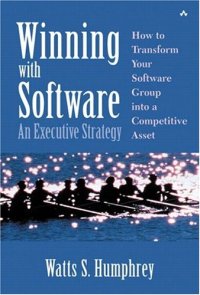
Ebook: Winning with Software: An Executive Strategy
Author: Watts S. Humphrey
- Genre: Computers // Programming
- Year: 2001
- Publisher: Addison-Wesley Professional
- Language: English
- chm
MESSAGE / CONCEPT
The message here is that if you wish to develop good software, particularly of any significant size, you need a robust process and a team of disciplined programmers/engineers. The operative words here are robust and disciplined. These two terms, particularly the discipline one, resonate particularly well with us, because one of the significant causes of a problem project is the lack of discipline to follow a defined process. The further message is that "quality counts" - even more so than schedule. This is particularly relevant to any business that uses software.
When the project starts to "go off the track", the project team might go back to what they are comfortable with which often is the "lazy" approach. A bit like a football team - when things go pear shaped and they are on the back foot, bad habits sneak in .....tackles get missed, individuals don't get into position in defence, the ball gets dropped, the pass goes astray.....discipline goes out the window!
His personal software process (PSP) and team software process (TSP) aren't incompatible with the extreme programming (XP) or agile software development movement, although the XP crowd may disagree. I don't think Humphrey would disagree even though he is coming from the Software Engineering Institute (SEI) angle and was a significant player in the SEI Capability Maturity Model (CMM) development which is often held up as the antithesis of XP.
Having said all that and noting that the focus is on software development, the messages are equally applicable regardless of what is being developed. Overall, it is a good read with some excellent advice and practical examples. So don't be put off by the title and the fact it can be a bit dry in places, insert for software, your particular technology (missile, bridge, network, satellite, communications system, etc) and it will still make sense and provide you with some useful insights.
WHAT WE LEARNT
It more confirmed our present approach rather than taught us something new. BUT, it did enlighten us on a number of techniques we can use to show the value of taking a robust and disciplined approach to project management. So much so, we are getting another copy of the book and giving it to the manager of the project portfolio in one of our client organisations. This confirms for us that this is a book for executives.
The message here is that if you wish to develop good software, particularly of any significant size, you need a robust process and a team of disciplined programmers/engineers. The operative words here are robust and disciplined. These two terms, particularly the discipline one, resonate particularly well with us, because one of the significant causes of a problem project is the lack of discipline to follow a defined process. The further message is that "quality counts" - even more so than schedule. This is particularly relevant to any business that uses software.
When the project starts to "go off the track", the project team might go back to what they are comfortable with which often is the "lazy" approach. A bit like a football team - when things go pear shaped and they are on the back foot, bad habits sneak in .....tackles get missed, individuals don't get into position in defence, the ball gets dropped, the pass goes astray.....discipline goes out the window!
His personal software process (PSP) and team software process (TSP) aren't incompatible with the extreme programming (XP) or agile software development movement, although the XP crowd may disagree. I don't think Humphrey would disagree even though he is coming from the Software Engineering Institute (SEI) angle and was a significant player in the SEI Capability Maturity Model (CMM) development which is often held up as the antithesis of XP.
Having said all that and noting that the focus is on software development, the messages are equally applicable regardless of what is being developed. Overall, it is a good read with some excellent advice and practical examples. So don't be put off by the title and the fact it can be a bit dry in places, insert for software, your particular technology (missile, bridge, network, satellite, communications system, etc) and it will still make sense and provide you with some useful insights.
WHAT WE LEARNT
It more confirmed our present approach rather than taught us something new. BUT, it did enlighten us on a number of techniques we can use to show the value of taking a robust and disciplined approach to project management. So much so, we are getting another copy of the book and giving it to the manager of the project portfolio in one of our client organisations. This confirms for us that this is a book for executives.
Download the book Winning with Software: An Executive Strategy for free or read online
Continue reading on any device:

Last viewed books
Related books
{related-news}
Comments (0)